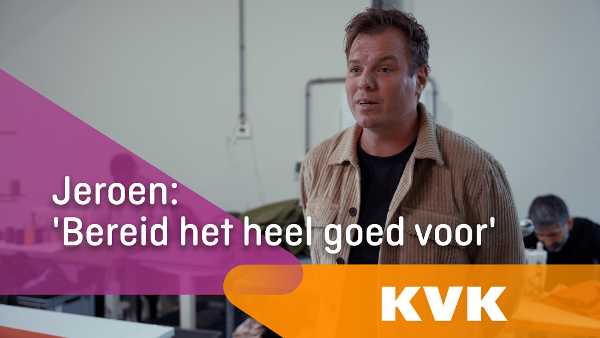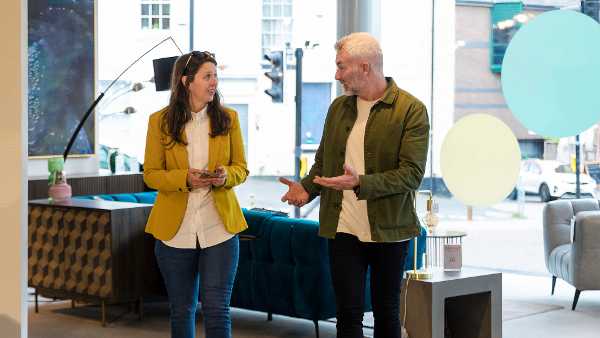The ideal supplier offers more than a competitive price
- Sandra Visser-Meijer
- Background
- Edited 28 March 2024
- 5 min
- Managing and growing
- International
You want to import a product. This involves all sorts of things. One of the first steps is to find a supplier. How do you go about this? And how do you know whether you are going to work with the right party? In this article you will read tips on how to find the ideal supplier. And you will discover why trading via an intermediary can be a good idea.
Before you start working with a new supplier, you want to be sure you are making the right choice. So you can check a foreign Business Register or ask for help from an embassy. But you will not get one hundred per cent certainty. Some choices you make on a feeling. Entrepreneurs Paul Stuijt and Gerard Haages explain how they do this.
Not for a quick profit
Paul Stuijt, founder of Durasolar, has been working with his Chinese supplier for 15 years. Long before Dutch people were queuing up for solar panels and slick salesmen wanted to make quick money with them. "Those cowboys weren't around back then," says Stuijt. But he was sure the demand for panels would grow strongly.
Stuijt joined several business networks in the Netherlands. At the same time, he did his own research. It gave him a few names, and with that information he went to China. That country was not entirely new to him, as he imported tools from the country for a former employer. "I could actually choose from several suppliers. Some even cheaper than others."
The longer I do business, the more I trust my instincts
For Stuijt, other things were more important than the lowest price. Conversations that were mainly about good prices and interesting margins could not convince him. "I'm not into the whole commercial thing. Then it gets too sticky for me and I drop out. I have a technical background and look strictly at quality. And, for example, whether support is available in Europe."
In five tips to an ideal supplier
1. Do research beforehand
"Before I went to China, I researched well. And determined my objective. It's good to know what you want to achieve. If you want to make money quickly, you might choose a different approach. I wanted long-term success. That's why I didn't immediately choose the first supplier I could find. I did research through trade fairs and lectures. I travelled to Germany and Spain, among other places, for it. That took six months.
Stuijt was convinced there was a market for his product in the Netherlands. Especially in the longer term. "There was no question of an enormous demand yet. But I already knew that an energy transition was coming. I jumped on that early."
2. Listen to your gut feeling
"When looking at the long term as an entrepreneur, I think you have to listen carefully to your gut feeling. I could have gone for a cheaper supplier 15 years ago, but it didn't feel right. I felt the quality of the equipment was insufficient. And there was no technical support in Europe. I wanted to build a long-term relationship so I really followed my gut feeling. The longer I undertake, the more I trust that."
3. Ask critical questions
Stuijt has a lot of technical knowledge. So he did not settle for smooth sales talk, but wanted to know everything about the solar panels and inverters he was going to import. "I kept asking. Why do you do this like this? How does it work then? I did that with different suppliers. Just until I knew it was right."
The fact that his supplier gave the right answers reassured Stuijt. But it provided another plus. "They discovered that I also understand business. They appreciate me for that. It's one of the reasons I've moved on. I now have a wholesale business. For the supplier, it's nice to have someone with knowledge selling their product in the Netherlands ."
4. Work on trust
"It comes on foot and leaves on horseback," says Stuijt. In other words, building a bond takes time. "And if that bond with a Chinese business partner is there, it can be very strong. So be careful with it. It works both ways." As an importer, you want to receive your products on time with high quality. Conversely, a supplier wants to be sure the buyer will pay.
5. Show what your plan is
"Do you want long-term success and a good business relationship? Then share your plans with your supplier." According to Stuijt, this does the relationship with your partner good. "You build trust with this. For example, show how you want to grow. And discuss with your supplier whether there is room and staff for this. You can also sometimes use your supplier to show you the way. They are often knowledgeable."
Business interest comes first
A personal click with your supplier is nice, but your main interest is business. Therefore, look at the facts. Does the distance from your supplier cause problems? Can you get along with the language and culture? Also consider what you expect from production capacity, stock and terms of delivery.
Working with a local intermediary
Starting importers often work with one party. In practice, the number of suppliers sometimes expands rapidly. Possibly by dozens at a time. This makes maintaining contacts more difficult. It is easier to keep a grip on quality and delivery time, for example, by making clear agreements with your suppliers. Contracts, quality controls and quality marks can help. And a reliable intermediary can arrange many things for an importer from another country.
Gerard Haages works together with two intermediaries from China. With his Kees B.V., he supplies 'what the customer asks for' in areas such as fitness, camping and outdoor. His range is so broad that he works with many different suppliers. "From trampolines to folding box carts and camping chairs to towels," he says.
Oddly enough, due to the pandemic I haven't met my intermediaries yet
Haages made his first contacts in China before he became self-employed. At the time, he worked for a sportswear manufacturer. When starting his own business, he carefully chose his partners in the country. He continued with people he already knew, or made sure he got to know future suppliers well. Not much different from Stuijt.
Multiple suppliers
Currently, personal contact with his suppliers is more difficult for Haages. "I haven't counted them, but there are at least 150 to 200," he says.
This hasn't changed the basis for collaboration. The way in which has. For a few years now, Haages has been working with intermediaries. "Two commercial ladies who know the local market well."
Certificate
Whether a producer is reliable, flexible and fast is no longer something the owner of Kees B.V. figures out himself. That knowledge lies with his intermediaries in China. The main requirement on his supplier now is that it works according to the BSCI standard. BSCI stands for Business Social Compliance . Within this initiative, businesses are committed to good working conditions in their global supply chain.
"With that, I know I'm in the right place. Among other things, a supplier promises that employees get decent wages, work normal hours and that child labour is excluded."
Haages also pays attention to the right certificates. "Which guarantee quality or rule out dangerous substances in a product." CE , for instance, is very important. "You need those to market products according to EU safety requirements."
Intermediaries
Whereas Haages spent time with each supplier in the beginning, he now relies on the knowledge of two local intermediaries. "The crazy thing is that because of the pandemic, I haven't met them yet. Well digitally, of course. But I know them through a Dutch business partner whom I trust. That makes me not doubt their work. They also have an interest in keeping me happy. They get a lot of work from me and earn per assignment. They know exactly what demands I have. And they don't have to come up with crazy prices. They know I know the market too well for that."
Working with two intermediaries saves Haages a lot of time and research. "I make the arrangements with my customers in the Netherlands. Then I put out an order. Within a few days, I get a document back with different suppliers and products. From those, I choose a supplier. I have had this approach for a few years now and it has really made my business more successful."
Supplier visits
Haages still visits his Chinese suppliers himself whenerver possible. When he is in the country for a trade fair, for example. "I still visit China about twice a year. And then it's good to see some people and workplaces."
The owner of Kees B.V. therefore definitely recommends this 'old-fashioned' way when an importer is looking for the right supplier. "Because there are also unreliable people among them. I went wrong once with someone I met at a trade fair. I didn't distrust anything. He even sent pictures of production. Afterwards, everything turned out to be fake. I lost my US$15,000 deposit. That just proves that it is best to see the production space yourself and speak to your supplier there."


